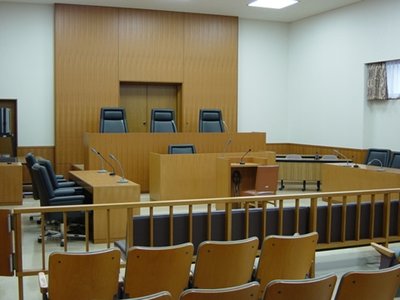Compensation Cases

Notice
This section was not included to deter people from seeking compensation in the courts; rather it was included to help people be better prepared and to better consider potential options and implications that may present in cases like these.
For anyone thinking about litigation, I can say from experience, and the many stories I have heard from others, that it can be extremely difficult and there appears to be several reasons for this as outlined below.
However, despite the numerous challenges and difficulties, pursuing litigation can also have its advantages.
Top of Page
(1) Attitudes
Although you may expect doctors, lawyers and judges to all be professional in their conduct; through my experience, it soon became apparent all parties were influenced by their own attitudes, beliefs and agendas.
These include:
- Doctors' attitudes
- Lawyers' attitudes
- Courts' attitudes
Top of Page
Basically when proceedings are lodged against doctors, like anyone else, they feel threatened. Instinctively, it is fair to say that the “fight or flight” instinct kicks in. However, in the case of being summoned to attend court proceedings, flight is not an option, so generally they will come out fighting.
Of course there is always the option of admitting fault, apologizing and working through a fair settlement, but it takes a lot of courage to do this and generally seems to be unheard of in cases such as these. Doctors have a reputation to upkeep after all.
When it comes to patient welfare versus protecting self interests, it seems many doctors will do whatever it takes to ensure the later…
Top of Page
Whether right or wrong, any defensive layer is going to protect their client and they will do everything they can to deny you any recognition for your suffering and associated losses. This is how they get paid.
Your own lawyer will have their own agenda as well. Although sympathetic to your situation, they will want to get the case over and done with as soon as possible because as the saying goes “time is money”. Subsequently, there may be added pressure for you to get certain things done by certain times.
Top of Page
When I first embarked upon my case, I must have been naive to think I only had two sets of opponents in the doctor and the hospital and their representative groups of lawyers. I must have been naive to think the courts were neutral; when later it became clearer that all was not as it should be (See Justice or Not? for clear concise reasons and examples).
In hindsight, it appears that in cases like these, some judges may begin with the desired conclusion in their own minds and then they set about constructing a pathway to reach that conclusion. It appears priority is given to maintaining the status quo (e.g. maintaining the multibillion dollar drug industries) rather than providing justice to a single individual.
Top of Page
(2) Tactics
In my personal experience, and after having had the opportunity to hear stories from many others, a pattern has emerged of the types of tactics doctors tend to employ as they set out to defend themselves.
These tactics can include:
- Creating confusion
- Blaming everything on the patient (victim)
- Twisting or distorting facts to create alternative scenarios
- Discrediting the patient (victim)
- Taking advantage of the patient's (victim's) vulnerability
Top of Page
According to my lawyer at the time, when there is doubt, the defense usually gets the benefit of that doubt.
As confusion creates doubt, this can be a common tactic. Needless to say, the nature of the confusion employed differs from case to case. I have given an example of confusion in my case below:
When proceedings for my case first began with mediation, “confusion” appeared to be the main tactic of choice employed by the defense. As written in article 7 of my statement, which was checked by my lawyer, “…both sides have continued to argue on different planes, and the mediator has been at loggerheads appearing quite fed up over the whole thing.”
However, after proceeding to the Tokyo District Court, and after Dr. Judson had introduced the application of the DSM-IV-TR diagnostic criteria for drug dependency into the equation, the defense were forced to address specific issues, so they needed to find a new tactic to maintain the element of confusion.
Enter the term “Autonomic Nervous Disorder” (The Perfect Smokescreen). Although this would never work in Western countries (because it is not recognized), and despite being totally unfounded, it obviously helped the defense here in Japan to achieve their objective of avoiding any accountability for my dependency and associated damages, and the courts were happy to support this.
Even if the doctor’s claims don’t make sense medically, scientifically, or even logically, the element of confusion can sometimes be enough to deny the victims any recognition or compensation for their suffering and losses.
Top of Page
One of the most common tactics is simply to blame everything on the patient. As they say “the best form of defense is attack”.
A frequent example of this is when doctors say “Oh, he had all those symptoms before the treatment”.
Unfortunately, related parties, including the courts, often fail to realize that it’s not a question of whether there were preexisting symptoms or not; of course there were, hence the reason why the person in question went to the doctor in the first place.
The point is that dependency causes an amplification of the original symptoms together with the development of totally new ones. This is due to a withdrawal reaction which can occur during the treatment due to tolerance and lost drug effect, during reduction, or after stopping.
When the original condition is amplified in this way, not only does it cause original symptoms to worsen, but it also causes the development of totally new symptoms that were not present at all before the drugs were prescribed.
This phenomenon is not always understood by doctors, lawyers, or the courts and is the cause of many cases where dependency goes unrecognized.
(NB: In clinical situations doctors tend to misdiagnose dependency states for other illnesses, or suggest that it’s a simple case of the original complaint having worsened, and proceed to prescribe more and more drugs compounding the problem.)
Consider this:
“Benzodiazepine withdrawal is a severe illness. The patients were usually frightened, often in intense pain, and genuinely prostrated. The severity and duration of the illness are easily underestimated by medical and nursing staff, who tend to dismiss the symptoms as "neurotic." In fact, through no fault of their own, the patients suffer considerable physical as well as mental distress.” Professor Heather Ashton: Emeritus Professor of Clinical Psychopharmacology, University of Newcastle upon Tyne, England.
Top of Page
Twisting or distorting facts to create alternative scenarios appears to be another strategy used for shifting the focus of proceedings in order to avoid any accountability.
Doctors may try to shift the arguments around so that you may end up arguing things that are totally illogical or irrelevant. It’s almost a case of them saying “I don’t want to fight you over there; you come over here”. No doubt the nature of this will differ from case to case, but just be aware of getting sucked into arguments that are designed to cause nothing but confusion (See point 2.1 above).
For me, my own case was not related to mental health, but I understand the majority of these types of cases are. For people who have had a history of psychological complaints, doctors can easily dig up things from your history to cause more confusion and mix it all in with a load of scientific expressions to make their arguments appear more convincing to the courts.
Top of Page
As mentioned above, they say “the best form of defense is attack”. So discrediting the patient (victim) is a good form of defense. Everything about you can come under attack and discredited, even your family.
Your entire past and everything about you can be dug up, twisted, misinterpreted and dragged through the public domain.
Unfortunately, this can get very ugly and can cause a lot of harm to someone who is already hurting considerably. It may also have the potential to weaken you to the point where your ability to fight on is compromised.
Top of Page
Many people who have suffered from prescription dependency go on to suffer the long term effects of that dependency including: protracted withdrawal syndrome, PTSD, and even permanent damages. They are also extremely vulnerable to stress.
From The Ashton Manual:
[Quote] “After withdrawal the ex-user is left in a vulnerable state with a decreased ability to deal with stressful situations.” [Unquote] (See information)
Needless to say, pursuing compensation through the courts is an extremely stressful event requiring the victim to recall, and in effect, relive the trauma associated with the incident. This can cause flashbacks with relapses of withdrawal.
From The Ashton Manual:
[Quote] “The experience of benzodiazepine withdrawal is deeply etched into the mind and memory of those who have been through it, and is actually physically present in the strength and connections of their neural synapses, as all memories are.” [Unquote]
[Quote] “For those who have experienced a traumatic benzodiazepine withdrawal, an element of post-traumatic-stress disorder (PTSD) may be involved. This is a recurrent condition that can be triggered by small reminders of the past trauma.” [Unquote] (See information)
Doctors are experts on discovering weakness; that’s what they do. In a court situation, doctors can set about exploiting these weaknesses.
To give an example in my case, both sides of the defense were claiming that my condition was simply caused by anxiety/stress alone and that I was prone to such; using the Japanese diagnostic term “Autonomic Nervous Disorder”.
Therefore, during the course of litigation, I found myself having to endure the most stressful experience imaginable with untold challenges whilst making sure not to show any signs of stress. This was INCREDIBLY CHALLENGING – an extreme razor’s edge balancing act between maintaining progress and my health… (See Challenges for more details)
No doubt everyone will have their own weaknesses and challenges that they will need to consider and vulnerability to stress following withdrawal will possibly be one of them.
Top of Page
(3) Circumstantial Implications
There are many implications you will need to consider if you are thinking about pursuing a litigation case for compensation and recognition of your losses and suffering.
These implications can include:
- Financial
- Emotional
- Effects on others
- Challenges
Top of Page
Needless to say, cases such as these require a great deal of funding (See Official Forms in my case). Even though I was able to get legal aid, it only served as a ‘loan’.
The other thing to consider is that unless you can get a ‘fair’ hearing, you could end up having to fund yet another injustice.
Top of Page
No doubt your previous doctor induced drug dependency would have already placed an incredible strain on your relationships with those around you including family, friends, work or otherwise.
The pressure that comes with cases like these will likely place yet another strain on those relationships which will no doubt need to be carefully considered by each individual based on their own circumstances.
Top of Page
Cases like these present an enormous amount of challenges. No doubt every case is different and you will no doubt have to identify and address any challenges or implications your own case presents. See challenges for examples in my case. Another challenge or implication in my case was of course the need to work across 2 different languages and cultures. See translation Errors – this may also be of interest to language enthusiasts.
Top of Page
(4) Judicial Problems
We all like to think the courts are unbiased, fair and component professionals. After all, they are funded by our hard earned taxes to protect us and provide justice when the need arises and to maintain harmony in our society. However, in my case, I found there were 2 main areas of significant doubt.
These include:
- Attitudes
- Level of Competency
Top of Page
I found there was a significant lack of expertise and competency on the part of the judiciaries in my case. It was quite clear that none of the parties involved really understood the nature of benzodiazepine dependency, withdrawal reactions etc.
The proceedings were a complete shambles as well. More than half of the DSM-IV-TR diagnostic criteria for drug dependency had not been addressed in the High Court verdict, our key witness was twice denied the opportunity to testify (District and High Courts), it wasn’t suggested that we translate all the patient files so the reports can be based on them until after the case had entered the High Court, the original High Court Chief Justice was replaced part way through proceedings by another Chief Justice who knew absolutely nothing about the case or benzodiazepines and so on and so on…
See Justice or Not? for more specific details and examples.
Top of Page
Despite all the difficulties and challenges, perusing a litigation case for compensation can also have its benefits including:
- You can take confidence from having the moral high ground.
- You may actually get compensated.
- The process may help you to understand what happened to you and why – to put the pieces together.
- Putting the pieces together and confronting the source of your suffering may also help you with getting some closure on the ordeal.
- The more cases like this are brought to the attention of the authorities, the more the problem gets recognition.
- The more people who seek cases, the more pressure it puts on the authorities to address the problem and improve the situation.
- Although very difficult to endure, you may come out a stronger person with an increased skill set because of it.
Top of Page
As outlined above, there are many challenges and difficulties for the victims when pursuing a judicial case for compensation.
Due to the complexities (and plain ignorance) many people, including doctors, have a great deal of difficulty understanding how benzodiazepine dependency and withdrawal reactions actually work. Further when getting into arguing differential diagnoses, things can become very messy, confusing and indeed frustrating.
As Prof. Ashton once told me “To get involved with benzos seems to be like opening a can of worms or worse - sometimes serpents!!”
However, that being said, there are also advantages in pursuing a judicial case for compensation as well.
No doubt each and every case will be different, as will each individual’s ability to cope depending on individual circumstances such as: health, finances, family commitments and so on.
Therefore, I think it is wise to sit down and carefully think things through as far as the risks and benefits are concerned. Needless to say, it is also important to find a lawyer who understands the implications of benzodiazepines and how they work. Your lawyer will no doubt give you an assessment of your case based on its merits from his own legal perspective.
In making your decision as to whether or not you should proceed, I also recommend discussing things with friends and family because, not only will it give you some additional perspectives, you’re decision may also affect their lives as well. However, ultimately the decision will be yours. Best of luck!
Top of Page

This website has been constructed by me personally for the purpose of raising awareness about doctor induced benzodiazepine drug dependency and litigation problems.
The purpose of this site does not include any form of retribution. Also, for privacy reasons the defendants’ names along with certain other names have been omitted from all public documentation contained herein.
There are no other persons / parties involved and it in no way represents any organization or activist type movements.
It is not intended as medical or legal advice – please see Disclaimer.
Most surprising of all, the high court relied on the packaging produced by the pharmaceutical company to determine the dosage at which benzodiazepines could be deemed addictive.

“I don't feel like I lost, I feel like I won and the court failed,” he says. “It feels like they were protecting the doctors and failed to protect society.” "What I want to do is use my experience and the material generated through my case to provide a resource to others who are dependent or may become dependent."
THE WRITING IS
ON THE WALL
for benzodiazepine use

Dr Andrew Byrne
Redfern NSW Australia
Benzodiazepine Dependence, 1997
“If any drug over time is going to just rob you of your identity [leading to] long, long term disaster, it has to be benzodiazepines.”

Dr John Marsden,
Institute of Psychiatry, London
November 1, 2007
“Benzos are responsible for more pain, unhappiness and damage than anything else in our society.”

Phil Woolas MP,
Deputy Leader of the House of Commons,
Oldham Chronicle, February 12, 2004
“The benzodiazepines are probably the most addictive drugs ever created and the vast army of enthusiastic doctors who prescribed these drugs by the tonne have created the world's largest drug addiction problem.”

The Drugs Myth, 1992
“If there's a pill, then pharmaceutical companies will find a disease for it.”

Jeremy Laurance,
The Independent, April 17, 2002.
“To rely on the drug companies for unbiased evaluations of their products makes about as much sense as relying on beer companies to teach us about alcoholism.”

Marcia Angell MD
(Former) Executive Editor New England Journal of Medicine
“It is more difficult to withdraw people from benzodiazepines than it is from heroin.”

Professor Malcolm H Lader
Institute of Psychiatry London
BBC Radio 4, Face The Facts
March 16, 1999
“Withdrawal symptoms can last months or years in 15% of long-term users. In some people, chronic use has resulted in long-term, possibly permanent disability.”

Professor C Heather Ashton
DM, FRCP,
Good Housekeeping, 2003
“Clearly, the aim of all involved in this sorry affair is the provision of justice for the victims of tranquillisers.”


This section focuses on some of the apparent injustices of the Japanese courts in my case. To help highlight these, some parts of this section include cross-referencing between the High Court Verdict and the Dependency Reports which were all based on the official evidence and the DSM-IV-TR diagnostic criteria for dependency.
The amount of actual loss and damages in my case can be seen in the Official Loss and Damage Forms which are registered with the courts.

My Official Court Statement 2 may help give an idea of the nature of some of these damages.

- Our key witness was twice denied the opportunity to testify – once by the Tokyo District Court and once by the Tokyo High Court.
- The Tokyo District Court judge raised an issue in the defense's favour only after proceedings had ended totally denying us any opportunity for rebuttal.
- The Tokyo High Court judge chose to use the package inserts from the drug companies to determine the amounts at which benzodiazepines could be deemed addictive, completely ignoring the extensive evidence (literature, expert opinions etc) submitted to the contrary.
- The courts made no issue over the prescribing doctor diagnosing me with one thing and treating me with drugs used for something completely different.
-
More than half the applied DSM-IV-TR diagnostic criteria for dependency were not addressed in the verdict.
- The presiding High Court judge was replaced half way through proceedings by a judge who knew absolutely nothing about the case or benzodiazepines before the verdict was delivered.








